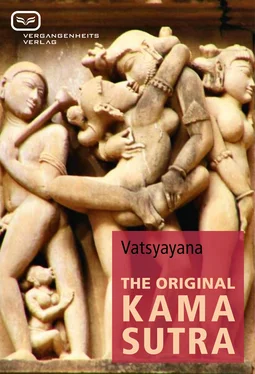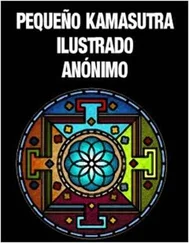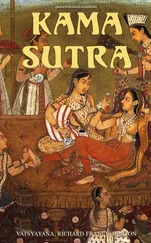Nayikas, therefore, are of three kinds, viz., maids, women twice married, and public women. Gonikaputra has expressed an opinion that there is a fourth kind of Nayika, viz., a woman who is resorted to on some special occasion even though she be previously married to another. These special occasions are when a man thinks thus:
a. This woman is self-willed, and has been previously enjoyed by many others besides myself. I may, therefore, safely resort to her as to a public woman though she belongs to a higher caste than mine, and in so doing I shall not be violating the ordinances of Dharma.
Or thus: —
b. This is a twice-married woman and has been enjoyed by others before me, there is, therefore, no objection to my resorting to her.
Or thus: —
c. This woman has gained the heart of her great and powerful husband, and exercises a mastery over him, who is a friend of my enemy; if, therefore, she becomes united with me, she will cause her husband to abandon my enemy.
Or thus: —
d. This woman will turn the mind of her husband, who is very powerful, in my favour, he being at present disaffected towards me, and intent on doing me some harm.
Or thus: —
e. By making this woman my friend I shall gain the object of some friend of mine, or shall be able to effect the ruin of some enemy, or shall accomplish some other difficult purpose.
Or thus: —
f. By being united with this woman, I shall kill her husband, and so obtain his vast riches which I covet.
Or thus: —
g. The union of this woman with me is not attended with any danger, and will bring me wealth, of which, on account of my poverty and inability to support myself, I am very much in need. I shall, therefore, obtain her vast riches in this way without any difficulty.
Or thus: —
h. This woman loves me ardently, and knows all my weak points, if therefore, I am unwilling to be united with her, she will make my faults public, and thus tarnish my character and reputation. Or she will bring some gross accusation against me, of which it may be hard to clear myself, and I shall be ruined. Or perhaps she will detach from me her husband, who is powerful, and yet under her control, and will unite him to my enemy, or will herself join the latter.
Or thus: —
i. The husband of this woman has violated the chastity of my wives, I shall therefore return that injury by seducing his wives.
Or thus: —
j. By the help of this woman I shall kill an enemy of the king, who has taken shelter with her, and whom I am ordered by the king to destroy.
Or thus: —
k. The woman whom I love is under the control of this woman. I shall, through the influence of the latter, be able to get at the former.
Or thus: —
l. This woman will bring to me a maid, who possesses wealth and beauty, but who is hard to get at, and under the control of another.
Or lastly thus: —
m. My enemy is a friend of this woman’s husband, I shall therefore cause her to join him, and will thus create an enmity between her husband and him.
For these and similar other reasons the wives of other men may be resorted to, but it must be distinctly understood that is only allowed for special reasons, and not for mere carnal desire.
Charayana thinks that under these circumstances there is also a fifth kind of Nayika, viz., a woman who is kept by a minister, and who repairs to him occasionally; or a widow who accomplishes the purpose of a man with the person to whom she resorts.
Suvarnanabha adds that a woman who passes the life of an ascetic and in the condition of a widow may be considered as a sixth kind of Nayika.
Ghotakamukha says that the daughter of a public woman, and a female servant, who are still virgins, form a seventh kind of Nayika.
Gonardiya puts forth his doctrine that any woman born of good family, after she has come of age, is an eighth kind of Nayika.
But these four latter kinds of Nayikas do not differ much from the first four kinds of them, as there is no separate object in resorting to them. Therefore Vatsyayana is of opinion that there are only four kinds of Nayikas, i.e., the maid, the twice married woman, the public woman, and the woman resorted to for a special purpose.
The following women are not to be enjoyed: —
A leper.
A lunatic.
A woman turned out of caste.
A woman who reveals secrets.
A woman who publicly expresses desire for sexual intercourse.
A woman who is extremely white.
A woman who is extremely black.
A bad-smelling woman.
A woman who is a near relation.
A woman who is a female friend.
A woman who leads the life of an ascetic.
And, lastly, the wife of a relation, of a friend, of a learned Brahman, and of the king.
The followers of Babhravya say that any woman who has been enjoyed by five men is a fit and proper person to be enjoyed. But Gonikaputra is of opinion that even when this is the case, the wives of a relation, of a learned Brahman and of a king should be excepted.
The following are the kind of friends: —
One who has played with you in the dust, i.e., in childhood.
One who is bound by an obligation.
One who is of the same disposition and fond of the same things.
One who is a fellow student.
One who is acquainted with your secrets and faults, and whose faults and secrets are also known to you.
One who is a child of your nurse.
One who is brought up with you.
One who is an hereditary friend.
These friends should possess the following qualities:
They should tell the truth.
They should not be changed by time.
They should be favourable to your designs.
They should be firm.
They should be free from covetousness.
They should not be capable of being gained over by others.
They should not reveal your secrets.
Charayana says that citizens form friendship with washermen, barbers, cowherds, florists, druggists, betel-leaf sellers, tavern keepers, beggars, Pithamardas, Vitas and Vidushekas, as also with the wives of all these people.
A messenger should possess the following qualities:
Skilfulness.
Boldness.
Knowledge of the intention of men by their outward signs.
Absence of confusion, i.e., no shyness.
Knowledge of the exact meaning of what others do or say.
Good manners.
Knowledge of appropriate times and places for doing different things.
Ingenuity in business.
Quick comprehension.
Quick application of remedies, i.e., quick and ready resources.
And this part ends with a verse: —
The man who is ingenious and wise, who is accompanied by a friend, and who knows the intentions of others, as also the proper time and place for doing everything, can gain over, very easily, even a woman who is very hard to be obtained.
End of Part I.
PART II.
OF SEXUAL UNION.
CHAPTER I.
KINDS OF SEXUAL UNION ACCORDING TO
(a) DIMENSIONS.
(b) FORCE OF DESIRE OR PASSION.
(c) TIME.
Kinds of Union.
Man is divided into three classes, viz., the hare man, the bull man, and the horse man, according to the size of his lingam.
Woman also, according to the depth of her yoni, is either a female deer, a mare, or a female elephant.
There are thus three equal unions between persons of corresponding dimensions, and there are six unequal unions, when the dimensions do not correspond, or nine in all, as the following table shows:
| EQUAL |
UNEQUAL |
| Men |
Women |
Men |
Women |
| HareBullHorse |
DeerMareElephant |
HareHareBullBullHorseHorse |
MareElephantDeerElephantDeerMare |
In these unequal unions, when the male exceeds the female in point of size, his union with a woman who is immediately next to him in size is called high union, and is of two kinds; while his union with the woman most remote from him in size is called the highest union, and is of one kind only. On the other hand when the female exceeds the male in point of size, her union with a man immediately next to her in size is called low union, and is of two kinds; while her union with a man most remote from her in size is called the lowest union, and is of one kind only.
Читать дальше












